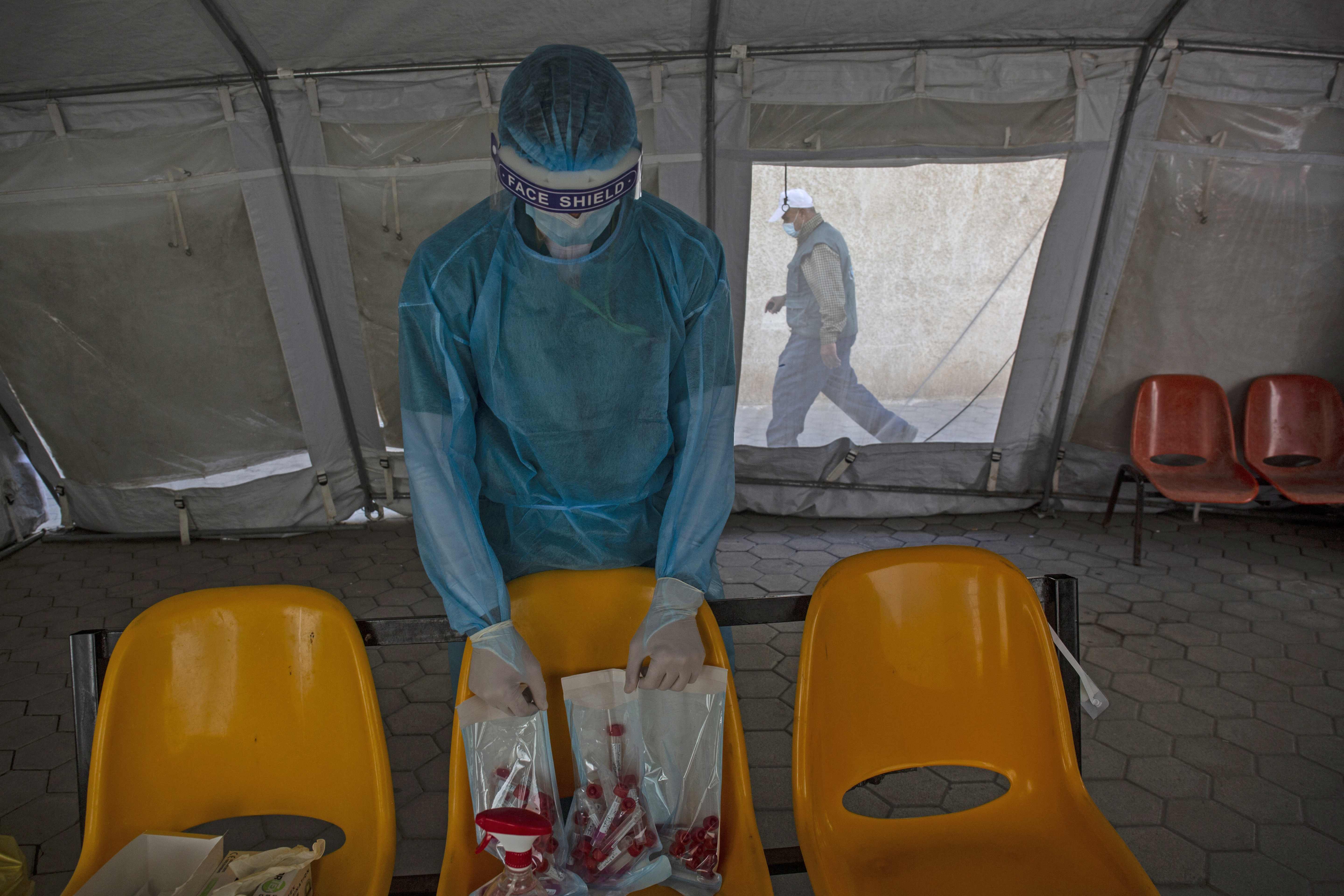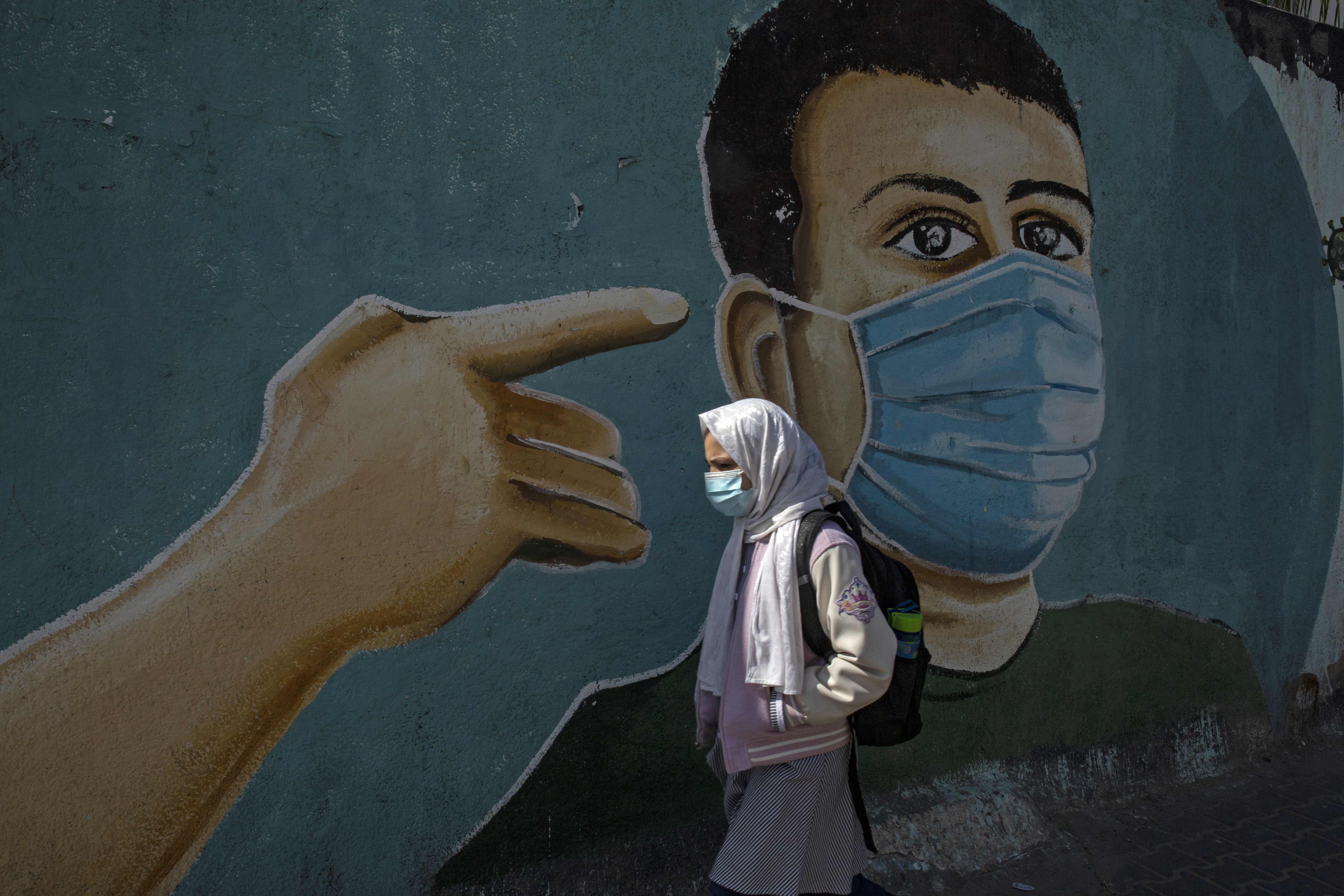Palestinians claim Israel blocked Covid vaccines from entering Gaza
Israel denies the claims, stating the pandemic knew ‘no borders’

Your support helps us to tell the story
From reproductive rights to climate change to Big Tech, The Independent is on the ground when the story is developing. Whether it's investigating the financials of Elon Musk's pro-Trump PAC or producing our latest documentary, 'The A Word', which shines a light on the American women fighting for reproductive rights, we know how important it is to parse out the facts from the messaging.
At such a critical moment in US history, we need reporters on the ground. Your donation allows us to keep sending journalists to speak to both sides of the story.
The Independent is trusted by Americans across the entire political spectrum. And unlike many other quality news outlets, we choose not to lock Americans out of our reporting and analysis with paywalls. We believe quality journalism should be available to everyone, paid for by those who can afford it.
Your support makes all the difference.Palestinian health officials have said Israel has blocked a shipment of 2,000 coronavirus vaccines to Gaza, the latest in an ongoing row between the two sides over access to jabs needed to stem the spread of the deadly pandemic.
Palestinian Health Minister Mai Alkaila said Monday that Israel bore “full responsibility” for preventing the Palestinian Authority from sending 2,000 doses of Russia’s Sputnik V to Gaza. The jabs were intended for frontline health workers in the besieged strip.
Israeli officials have, however, refuted the claim saying it had yet to decide on a transfer request it received for just 1,000 Sputnik V doses.
Israel’s foreign affairs and defence committee discussed details of the vaccine transfer policy on Monday including, according to Israeli media, whether it be tied to the return of two Israeli civilians and the remains of two Israelis soldiers believed to be held in Gaza by Hamas militant group.
In the discussions, committee Chairman Zvi Hauser reportedly expressed concern that the vaccines would go to Hamas not medical workers.
The PA, which governs part of the Israeli-occupied West Bank, has said it will share its vaccine supply with Gaza, which is run by Islamic militant group Hamas that seized power from its forces in 2007. The territory, which is home to more than two million Palestinians, has yet to receive any vaccines. Authorities there have reported more than 53,000 cases and over 530 deaths there since the start of the pandemic.
An Israeli official told the Associated Press that Israel had received a request to allow 1,000 Sputnik V doses to be delivered to Gaza that was debated late Monday.
The Israeli embassy in London told The Independent: “Without coordinating with Israeli authorities, representatives of the Palestinian Authority arrived at the Beituniya crossing point next to Ramallah carrying 1,000 Sputnik vaccines donated by Russia, with the aim of transporting them into the Gaza Strip.”
It added: “The pandemic knows no borders and Israeli authorities are committed to working with the Palestinian ministry of health in order to fight it together. In light of the current situation, it is not useful for the issue of vaccines to be continuously used for political purposes.”
The latest spat comes amid growing criticism from rights groups concerned by the massive discrepancy between the vaccine rollout in Israel and the occupied West Bank and Gaza. Israel has launched one of the most successful inoculation programmes giving jabs to more than a third of its population of 9.3 million since December.
Rights groups have also cited Israel’s obligations to vaccinate Palestinians as an occupying power under the fourth Geneva convention. Israel denies having such an obligation and says its priority is its own citizens, and has said that it has vaccinated Palestinians living in occupied East Jerusalem, as they have residency.
Israel provided 2,000 doses of the Moderna vaccine to the PA earlier this month, allowing it to begin vaccinating medical workers, and the PA says it independently acquired another 10,000 doses of the Sputnik V vaccine. It would need Israel’s permission to transfer them to Gaza, which has been under an Israeli and Egyptian blockade since Hamas violently took over the strip in 2007.
The AP reported that during Monday’s foreign and defence committee discussions on the vaccine issue, Roi Binyamini, a National Security Council official told the committee that the government had no intention of sharing Israel’s own supply of vaccines with Gaza. But he said the government was weighing requests from other parties to allow the PA to deliver its own vaccines to Gaza. He said he expected a decision to be made quickly.
It comes amid growing concerns about Gaza’s ability to handle the outbreak of coronavirus.
The blockade has left Gaza’s healthcare system on the brink of collapse. It has meant that today nearly 50 per cent of the essential drug list is missing, including oncology drugs, heart medicines and items such as intensive care masks and intubation tubes.
In December, Gaza health officials told The Independent they had run out of coronavirus tests, oxygen supplies were running low and their Intensive Care Units were near full.
A new report by the University of Bath earlier this month found that the challenges of handling the pandemic have been “fundamentally exacerbated” by the ongoing blockade which it said was the “dominant factor” in the worsening humanitarian situation there.

The authors of the report urged the international community to call for the lifting of the blockade, finding that with the economic crisis, collapsed health care system, electricity and water scarcity Gaza was woefully ill-equipped to handle the pandemic. It said Gaza was unable to properly impose key safety measures such as social distancing or quarantines.
Lead researcher Dr Caitlin Procter, a part-time Professor at the European University Institute in Florence, said few were able to comply with lockdown measures when it meant losing limited sources of income.
“Many do not seek medical treatment for other health conditions, driven by fear of being infected by COVID, and the severe loss of income that a diagnosis would incur,” she said. “For the same reason, some healthcare workers were also reluctant to treat COVID patients; and many individuals with symptoms do not go for testing.”



Join our commenting forum
Join thought-provoking conversations, follow other Independent readers and see their replies
Comments